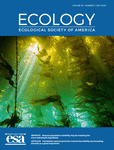
ECOLOGY
Scope & Guideline
Navigating the complexities of ecology with scholarly precision.
Introduction
Aims and Scopes
- Chemical Ecology:
A core area of focus, exploring how chemical signals influence interactions among organisms, including predator-prey dynamics, plant-insect interactions, and chemical communication among species. - Behavioral Ecology:
Research that delves into the behavioral adaptations of organisms in response to their ecological contexts, including mating strategies, foraging behaviors, and responses to environmental stimuli. - Ecological Responses to Environmental Changes:
Studies that examine how organisms adapt to changes in their environment, such as climate change, habitat loss, and pollution, with a focus on physiological and biochemical mechanisms. - Invasive Species Dynamics:
Investigations into the ecological impacts of invasive species, including their chemical interactions with native species and the effectiveness of biological control measures. - Metabolomics and Chemical Profiling:
Research emphasizing the role of secondary metabolites in ecological interactions, with a focus on the identification and functional analysis of these compounds in various organisms.
Trending and Emerging
- Chemical Signaling and Communication:
An increasing number of studies focus on the role of chemical signals in ecological interactions, including pheromones and plant volatiles, emphasizing their importance in behaviors such as mating, foraging, and host selection. - Microbial Ecology and Remediation:
Research into the role of microbes in ecosystem functioning and their applications in bioremediation is gaining traction, reflecting a growing interest in sustainable ecological practices. - Impact of Climate Change on Ecological Interactions:
An emerging theme is the investigation of how climate change influences ecological dynamics, particularly through changes in chemical signaling, plant-insect interactions, and species distributions. - Interdisciplinary Approaches:
There is a noticeable trend towards interdisciplinary research combining ecology with molecular biology, genetics, and biochemistry, leading to a more comprehensive understanding of ecological phenomena. - Insect-Plant Interactions:
Studies exploring the intricate relationships between insects and plants, particularly how secondary metabolites influence these interactions, are increasingly prevalent, showcasing their ecological and evolutionary significance.
Declining or Waning
- General Plant Ecology:
Research specifically focusing on plant ecology, including traditional studies on plant community dynamics, has seen less emphasis compared to more specialized chemical and behavioral interactions. - Classic Taxonomic Studies:
Although foundational, studies solely aimed at taxonomic classification without linking to ecological or chemical implications have become less frequent, as the journal encourages more integrative approaches. - Traditional Pest Management Strategies:
Investigations centered around conventional pest management, without the incorporation of ecological or chemical insights, are appearing less frequently as the focus shifts towards more innovative and sustainable approaches.
Similar Journals
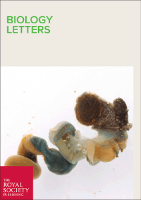
Biology Letters
Exploring the frontiers of biological inquiry with precision.Biology Letters, published by the esteemed Royal Society, stands at the forefront of research in the field of biological sciences, with a strong emphasis on innovative studies that bridge gaps across disciplines. Since its inception in 2005, the journal has garnered significant recognition, achieving a remarkable Q1 ranking in Agricultural and Biological Sciences (miscellaneous) and a percentile of 88th in the same category, according to Scopus rankings. Released in the United Kingdom, the journal offers a platform for authors to share concise research findings and theoretical perspectives that contribute meaningfully to the advancement of biological inquiry. Although not open access, the journal remains highly regarded in the academic community for its rigorous peer-review process and impactful content, making it an invaluable resource for researchers, professionals, and students dedicated to exploring the complexities of biology. With an ongoing commitment to excellence, Biology Letters continues to shape the future of biological sciences.

BEHAVIOUR
Fostering Insights in Animal Science and NeuroscienceBEHAVIOUR, published by BRILL, is a distinguished academic journal that serves as a pivotal platform for research in the fields of Animal Science and Behavioral Neuroscience. With a legacy dating back to 1948, this journal has been a cornerstone for scholars and practitioners seeking to explore the complexities of animal behavior, offering insights that are vital for both academic inquiry and practical application. The journal, which has an ISSN of 0005-7959 and E-ISSN of 1568-539X, is characterized by its rigorous peer-review process and commitment to disseminating high-quality research. Currently, BEHAVIOUR holds a Q2 ranking in Animal Science and Zoology and a Q4 ranking in Behavioral Neuroscience for 2023, indicating its respectable standing in the academic community. Researchers and students alike can access the journal through institutional subscriptions, and while it does not offer Open Access options, its importance in fostering understanding of behavioral patterns across species is indisputable. This journal continues to be an essential resource for those looking to deepen their knowledge and contribute to the evolving discourse in animal behavior.
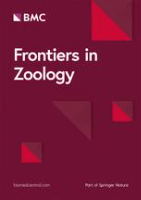
Frontiers in Zoology
Pioneering discoveries in animal behavior and systematics.Frontiers in Zoology is a premier, open-access journal published by BMC that has been a cornerstone of zoological research since its inception in 2004. With a commitment to advancing the field, this journal covers a broad spectrum of topics within Animal Science and Zoology, as well as Ecology, Evolution, Behavior, and Systematics. Recognized for its quality, it holds a distinguished Q1 ranking in both of these categories and ranks within the top percentiles in Scopus, with 87th and 78th percentiles, respectively. Based in the United Kingdom, it provides researchers, professionals, and students with innovative studies and findings that encourage interdisciplinary collaboration and exploration. The journal is dedicated to facilitating the open exchange of scientific knowledge, making it an essential resource for those seeking to stay at the forefront of zoological and ecological sciences.

Journal of Vertebrate Biology
Advancing knowledge in vertebrate biology.Journal of Vertebrate Biology, a reputable publication established by the Institute of Vertebrate Biology in the Czech Republic, serves as a vital platform for research across the fields of Animal Science and Zoology, Aquatic Science, and Ecology, Evolution, Behavior and Systematics. With its ISSN 2694-7684 and a commendable 2023 Q2 ranking in multiple categories, this open-access journal embraces innovative scientific inquiry and fosters academic discourse. The journal's commitment to disseminating high-quality research is reflected in its Scopus rankings, positioning it within the top quartile in several impactful areas. As it continues to converge its focus until 2024, researchers, professionals, and students alike are encouraged to engage with cutting-edge studies that advance our understanding of vertebrate biology. This publication stands out not only in its scholarly contributions but also in enhancing global awareness of biodiversity and conservation issues.
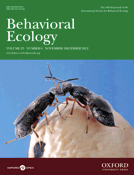
BEHAVIORAL ECOLOGY
Pioneering Research on the Dynamics of Animal InteractionsBehavioral Ecology, published by Oxford University Press Inc, stands as a premier journal in the field, bridging the disciplines of animal science and ecology. With an impressive impact factor reflecting its rigorous scholarship, this journal ranks in the top quartile (Q1) for both Animal Science and Zoology as well as Ecology, Evolution, Behavior and Systematics, positioning it among the elite academic publications. Since its inception in 1990, Behavioral Ecology has served as a vital platform for cutting-edge research that explores the ecological and evolutionary implications of animal behavior, catering to a diverse audience of researchers, professionals, and students. The journal's commitment to high-quality peer-reviewed articles ensures that it remains a key resource for advancing knowledge in the field. Readers can access the journal through institutional subscriptions for comprehensive insights that drive ongoing research and discussion.

ZOOLOGICHESKY ZHURNAL
Pioneering research in zoology for over seven decades.Zoologichesky Zhurnal, a prominent journal in the field of Ecology, Evolution, Behavior and Systematics, has been a vital publication since its inception in 1950. Published by MAIK Nauka-Interperiodica in the Russian Federation, this journal has established a notable reputation in disseminating scientific research and advancing knowledge in zoology. With its coverage spanning from 1950 to 2023, and a specific convergent focus during 1982-1983, this journal contributes significantly to the ecological and evolutionary sciences, even though it currently holds a Q4 classification in the 2023 category quartiles, indicating its niche positioning among peers. Researchers and students engaged in the study of biological sciences, particularly those interested in the dynamics of ecosystems, behavior of species, and evolutionary processes, will find valuable insights and original research articles within its pages. While access to this esteemed journal is not open, it remains an essential resource for those seeking to deepen their understanding of zoological sciences.
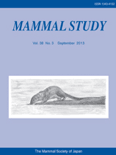
MAMMAL STUDY
Exploring the diverse world of mammals and their ecosystems.Mammal Study, published by the Mammalogical Society of Japan, is a leading academic journal dedicated to the field of mammalogy and related biological sciences. Since its inception, it has provided a critical platform for researchers, professionals, and students to share their findings and insights into the diverse facets of mammalian biology, ecology, and conservation. The journal, with ISSN 1343-4152 and E-ISSN 1348-6160, is recognized for its rigorous peer-review process and has attained a commendable Q3 ranking in the 2023 category of Animal Science and Zoology. With an impact factor reflecting its growing influence—ranking 283 out of 490 in Scopus—we welcome contributions that advance the understanding of mammalian species and their habitats. While access to published articles is through traditional channels, the journal aims to reach an even wider audience by fostering greater awareness and appreciation for mammalian research and conservation efforts. The Mammal Study has converged years of insightful publications from 2008 to 2024, solidifying its position as a vital resource in the biological sciences.

JOURNAL OF CHEMICAL ECOLOGY
Connecting Chemical Insights to Ecological ChallengesJOURNAL OF CHEMICAL ECOLOGY, published by SPRINGER, serves as a pivotal platform for research that bridges the fields of ecology and chemistry, enriching our understanding of the chemical interactions within ecosystems. Established in 1975 and continuing through 2024, this esteemed journal holds a respectable Q2 ranking in multiple categories, including Biochemistry and Ecology, Evolution, Behavior and Systematics, indicative of its significant impact in the scientific community. With a strong focus on the chemical aspects of ecological research, the journal invites contributions that explore the complex interactions between organisms and their environments, which is crucial for addressing current environmental challenges. While the journal does not currently offer open access options, it remains highly regarded among researchers, professionals, and students interested in the latest developments in chemical ecology, as evidenced by its active readership and credible impact factor. The editorial board comprises experts dedicated to fostering innovation and knowledge dissemination in this vital interdisciplinary field.

ECOLOGICAL RESEARCH
Bridging knowledge and action for a thriving planet.ECOLOGICAL RESEARCH is a prestigious academic journal published by WILEY, dedicated to advancing the field of ecology and its associated disciplines. Since its inception in 1986, the journal has consistently provided a platform for high-quality, peer-reviewed research, contributing significantly to the understanding of ecological systems and their complexities. With an impressive 2023 impact factor reflected in its Q1 ranking in the category of Ecology, Evolution, Behavior, and Systematics, it stands among the top journals in its field, as evidenced by its Scopus rank of #192 out of 721 and placement in the 73rd percentile. While accessible through standard subscription models, this journal plays an essential role in disseminating crucial findings and innovative methodologies to researchers, professionals, and students alike. With a commitment to fostering ecological knowledge and collaboration, ECOLOGICAL RESEARCH continues to influence ecological practices and policies, shaping the future of research in this critical area.
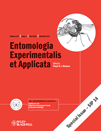
ENTOMOLOGIA EXPERIMENTALIS ET APPLICATA
Advancing insect science through innovative research.ENTOMOLOGIA EXPERIMENTALIS ET APPLICATA is a premier journal dedicated to advancing the understanding of insect science through innovative research and thorough experimental methodologies. Published by Wiley, this esteemed journal has been at the forefront of entomology since its inception in 1958, with its latest convergence extending until 2024. With a commendable Impact Factor and categorically positioned in the Q2 quartile across both Ecology, Evolution, Behavior and Systematics and Insect Science fields, it plays a pivotal role in the dissemination of critical findings. The journal is indexed in Scopus, ranking 43rd out of 181 in Insect Science, showcasing its relevance and stature within the academic community, while maintaining a robust visibility among scholars. Given its rigorous peer-review process and a commitment to quality and innovation, ENTOMOLOGIA EXPERIMENTALIS ET APPLICATA serves as a vital resource for researchers, professionals, and students aiming to deepen their insights into entomological research.